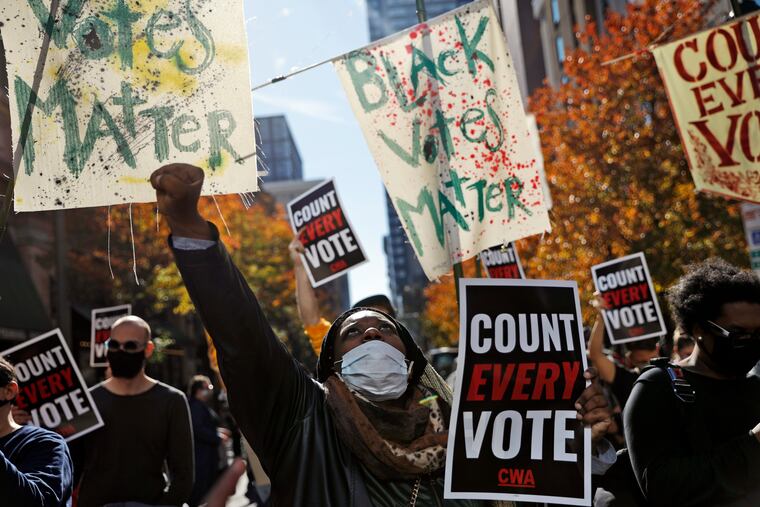To build trust in the electoral process, let’s ‘pull back the curtain’ on how it works | Opinion
Our democracy is not a guarantee. It’s up to all of us — Republicans, Democrats, and independents alike — to modernize and invest in it.

Russia’s invasion of Ukraine, a democratic country that freely elected President Volodymyr Zelensky, is a stark reminder of democracy’s fragility and its regression globally. Today, only 13% of the planet’s population lives in a democracy. In the United States, our own democracy is under immense stress. According to Freedom House, U.S. democratic institutions have “suffered erosion” in recent years, as reflected in “partisan pressure on the electoral process,” among other things.
As a former election official from Colorado, I have spent almost 20 years introducing pro-voter policy and process innovations to improve our election system. U.S. elections are free, fair, and democratic, but much of our infrastructure is outdated. There is also a broad lack of public understanding of how our elections are administered. Voters cast their ballot and await the results, but otherwise know very little about the inner workings of this hallmark of our democracy.
By and large, this has not been a source of controversy historically, because while our electoral process can be esoteric, the larger population has trusted it. But since 2020, a motivated partisan campaign has weaponized disinformation to undermine trust in our elections, and the obscurity around election administration has become costly. It’s time we pull back the curtain, infuse the principle of “total transparency,” and demystify our elections for all Americans.
More transparency, more trust
My commitment to transparency is why I helped launch the nation’s first “ballot tracking system” in Denver in 2009, which has now expanded to many states across the country. With more and more voters opting to cast their ballot by mail, ballot tracking technology gives the public greater visibility into the voting process and makes it easier for them to follow the status of their ballot — including once the ballot has been accepted and processed for counting, and quicker notifications if there is an issue with their ballot.
» READ MORE: Election reform must remain a priority for Pennsylvania | Editorial
I also gave tours to members of the press and the public so they could see firsthand how our elections were run. By opening up our process, we gave visibility to our work, inspiring greater understanding and trust in our democratic process. These efforts raised eyebrows among some of my peers at the time, but I’m convinced this work created more trust in our local election process, and without it, the problems with disinformation that arose around the 2020 election would have been even worse.
These basic pro-voter policies can improve the voting experience, and they require not only foresight but funding. Lawmakers can support “total transparency” — as well as access, fairness, safety, and equity — within our elections through concrete legislative action.
How elected leaders can help
Our government shouldn’t be writing blank checks to local election boards. Funds should be linked to changes that work — such as automatic voter registration, which is proven to improve the accuracy of voter address information; regular voter list maintenance to ensure voters can vote where they live; same-day voter registration so that the most current group of electors are choosing elected politicians; fair access to voting options; preprocessing mail-in ballots before Election Day; and adhering to cybersecurity standards that evolve to meet emerging threats.
Additionally, lawmakers should do more to protect election workers who are facing threats due to the ongoing “Big Lie” campaign led by former President Donald Trump and his supporters. A recent survey of election officials found that one in six has experienced threats since the 2020 election, and over 75% believe the federal government can do more to support them. Any effort to threaten or intimidate these hardworking officials and volunteers is a direct threat to our democracy and should be dealt with forcefully. We need stiffer criminal penalties, and law enforcement should prosecute perpetrators of such abhorrent acts against our election officials and poll workers.
“Our democracy is not a guarantee. It’s up to all of us — Republicans, Democrats, and independents alike — to modernize and invest in it.”
Lastly, Congress should update the Electoral Count Act, which provides the framework that the Electoral College follows after a presidential election and the timeline Congress abides by when counting the electoral votes.
The law, which was passed in 1887, is outdated and difficult to understand. It is vulnerable to misinterpretation and exploitation by bad actors who could attempt to overturn the will of the people. As someone who has dedicated her career to ensuring every eligible vote is counted, it is hard to fathom a more distressing scenario than partisan politicians seeking to invalidate a free and fair outcome and violating the right of Americans to self-govern. Unfortunately, that happened on Jan. 6, 2021. Congress can mitigate this risk by clarifying the rules to ensure everyone abides by the U.S. Constitution.
Our democracy is not a guarantee. It’s up to all of us — Republicans, Democrats, and independents alike — to modernize and invest in it. By increasing the public’s understanding of how votes are counted, establishing a zero-tolerance policy as it relates to threats against election officials, and making sure we all follow the same constitutional framework, we can effectively counter disinformation and bad faith efforts to undermine our democratic elections.
Amber McReynolds is a member of Issue One’s National Council on Election Integrity and one of the country’s leading experts on election administration and policy. She is a former election official and was appointed by the president and confirmed by the Senate in 2021 to serve on the U.S. Postal Service’s Board of Governors.